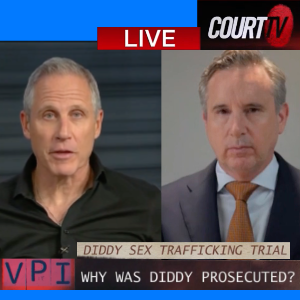
Will Judge Kick Willis Off Trump Election Trial?
[Source: Forbes]
Celebrity lawyer Christopher C. Melcher, who is ranked as a best family law attorney in CA, discusses if Judge McAfee will kick Fani Willis off the Trump election trial on Forbes Breaking News.
Ali Jackson-Jolley: I’m here with Chris Melcher. He is a top family law attorney and a legal commentator.
We’ve got a really meaty topic to cover today, and that is the Fani Willis ethics case. I was hoping that you could tell us what you think we should know about this case.
Fani Willis Ethics Case Explained
Chris Melcher: Well, this raises a lot of issues. I mean, there’s this personal relationship that she has with Nathan Wade, the special prosecutor that she appointed. She’s obviously leading one of the most significant cases in the country and then finding herself on the witness stand, talking about some very personal details, and obviously there are questions about whether this is an appropriate examination of whether she’s acted ethically or whether she’s just being penalized for having brought this case.
Ali Jackson-Jolley:
And so the thing I wanted to ask you, was Nathan Wade, his action in filing for divorce when he did, do you think that timing is suspicious? Is this something that is normal? What are your thoughts on that?
Chris Melcher:
Sure. So just a little bit more on background, Nathan Wade was married but then said he was separated from his wife. He actually said his wife had an affair. And so they were living separately. And according to Nathan Wade and Fani Willis, Nathan got the special prosecutor job from Fani Willis. And then there was a relationship that developed between the two of them thereafter. Now, at some point later on, I mean in terms of when Nathan broke up with his wife, there was much later on that he actually proceeded or they proceeded with that divorce case.
And one inference is that they weren’t really separated, Nathan and his wife for that long, and they’re making that up and that basically that this relationship was an affair with Fani Willis against his wife. So that’s one kind of accusation that’s been made. But I really don’t see the evidence of that coming out. And it’s common for people to separate and then take quite a long time to move forward with their divorce because one, it’s a very difficult thing to tackle for folks and they don’t want to deal with it. And second of all, sometimes they figure maybe there’ll be reconciliation. So those cases do naturally take time. So I don’t see anything suspicious about the fact that they separated and then Nathan Wade proceeded with the case much later.
How Nathan Wade Was Paid
Ali Jackson-Jolley: Okay. And then another piece of intrigue or interest has to do with the way that Nathan Wade was paid. We know from watching this develop in real time that Fani Willis has allegedly paid Nathan in cash for a lot of different services and those, he couldn’t even trace some of them. And yet other things like rent were paid using cash app. So can you help me understand, as a divorce attorney, is this more normal than the average person who hasn’t gone through a divorce may understand or does this seem unusual to you?
Chris Melcher:
Well, sure. I mean, when there’s a divorce case going on, we are looking at this spending to see what’s happening. Does it match their income or are they having an affair or any of this stuff? So there’s always this examination. But here in this case, we’re really interested in whether the compensation that Nathan Wade is receiving from Fulton County to act as a special prosecutor appointed by Fani Willis is being funneled back to Fani Willis. So again, just for background, if case folks don’t know all of the history is that Fulton County’s prosecuting this case against former President Donald Trump and a bunch of other people. And look, these prosecution offices aren’t big enough, so sometimes they have to hire outside counsel or for other reasons they’ll do that. So Nathan Wade was selected and being paid hourly to do this and has made upwards of $700,000 doing that hourly work.
Was Fani Willis Benefitting?
Now, so the question becomes, since they now have admitted to having a personal or intimate relationship, whether Fani Willis is benefiting financially from that arrangement? She’s the one who appointed him, she’s the one who supervised him. Is there money coming through the back door? Now, she has definitely placed herself in a place where she has to be questioned on this. And they were taking trips to various places, they were going to dinner and events. Fani Willis has testified and Nathan Wade said it was all equal. No one paid for each other. They balanced it out in cash. So if they did something, there were some cash payments. And some of these were some cruises, so there would’ve been some fairly large cash payments and or one person paid for something and the other person paid for something else, and it all kind of balanced out, and that probably is true.
The problem though is that they don’t have records of it because she did it in cash. She explained that her father always advised that she carry cash, and that’s just her way of doing things. So I would suspect she doesn’t use cash apps. That’s just not her thing. She actually has cash. None of us do, but she’s got cash, she uses it. That’s the way she runs her life, which is totally fine. But the problem is that she’s in a position in a high profile prosecution, probably one of the biggest cases in the US going on right now. She’s a public servant. She is having an intimate relationship with a subordinate in the workplace, and she obviously would be called to question on these things, but she didn’t keep a record.
Fani Willis’ Cashless Trail
And just as a side note, in California, we will have judges, sitting judges sometimes attend a dinner event, and I’ve always seen them take the server aside and saying, I need a separate check and get that separate check and use a credit card and pay for it because they don’t want an appearance that anyone in that group, the attorneys paid for their meal. That’s kind of comes back in my mind and why didn’t Fani Willis think of that and saying, even though she likes to pay in cash to have a paper trail, so if this was came up, they could say, “Look, I paid for my own cruise.” But now it looks just weird because it’s all in cash.
Ali Jackson-Jolley:
Yeah. So thank you for talking about questionable ethics, some questionable stuff that’s happening. This does feel like this has been a talking point pretty early on, and some would say that Fani Willis of all things lost the court of public opinion early in. Do you think that’s accurate, or do you think that regardless if this was anyone, whether a black woman, a white woman, a white man, we would be seeing the same sort of heightened concern and disdain even for these kind of actions?
Fani Willis’ Actions Scrutinized
Chris Melcher: Well, I’ve given this a lot of thought, and I think there’s several dimensions to this. One is this is a highly polarized case. So anyone on the, let’s say Trump and co-defendant side of things are going to see this as completely wrong and no matter what the explanation is, and of course she has had a lot of threats and stuff that this has been a very difficult experience for her. And so now it’s just going to be even more intense, unfortunately for her. Now, the supporters on pro prosecution side are going to see this as being completely wrong. It’s not about her, it’s about the defendants. And I don’t think any of those opinions are going to change. Now, where I’ve been looking at it though, from a completely different perspective, one is as an employer, and I know as an employer we get training and as a supervisor, you have to avoid intimate relationships in the workplace because that could lead to sexual harassment.
Now here, this is completely consensual relationship, but she was still his supervisor. She appointed him and I assume had the power to fire him. And now entering into an intimate relationship with him while that case is going on is bad judgment, I don’t know if it violates specific policy of the Fulton County District Attorney’s office, but this is bad judgment in the sense of a supervisor having an intimate relationship with a subordinate. That just is something we should not be doing.
Secondly, she is a prosecutor. And yes, I mean this is a powerful role. It’s political and it’s also quasi-judicial that you think about the power and how scary this is to be prosecuted. If any of us suffered that fate, maybe we did something wrong, maybe we didn’t do something wrong, and now we have the power of the state of Georgia coming down on us and trying to put us in prison, and it would be devastating. So that power has to be used appropriately with a concern for justice and making sure there’s no improper purpose or even the appearance of improper purpose.
So for her to have an intimate relationship with Wade who she appointed and is supervising and is not directly paying, but because of her act, he is being paid, and not to keep records of that and to pay him in cash to reimburse for the things that they did together, again, poor judgment. The going on trips and on cruises and public events while they were having this private relationship and thinking that no one would find out about it also, it’s just questionable to me. So again, I think at the end of the day, the legal analysis will be that this does not disqualify her from prosecuting. It’s a bad look. I think it’s really poor judgment on her part. She’s been taken to task for it.
My sense is that Judge McAfee will say these very things to her that this was really inappropriate, but there’s no evidence of a quid pro quo, meaning that there’s no evidence that Nathan Wade is taking money and giving it to her in the back door kind of way of profiting off of this prosecution. I don’t think that they’ve established that, but this is damaging to her. I think when we look at it more from that legal, practical employment standpoint, this is bad judgment and it has to me, nothing to do with race or gender. It’s just people in power have to act responsibly.
Ali Jackson-Jolley:
Yeah. And so I heard you say a few times the harm of improper appearance when you are in court, when you are prosecuting someone. So based on all of this, what do you think are the chances that Willis will stay on this case?
Will Judge AcAfee Remove Willis?
Chris Melcher: Well, it’s going to be up to Judge McAfee. He has the power to remove a prosecutor. And again, that is a severe remedy and would have to be done in the event that the defendant can just simply not get a fair trial without the removal of that prosecution team. Now, part of this does look at the appearance of impropriety. So the fact that Fani Willis and Nathan Wade may have done absolutely nothing wrong, but if there’s an appearance there that a reasonable person would entertain doubt that these defendants cannot get a fair trial, the judge may be required to remove them. My sense is that she’s not going to be removed. And if that happens, the prosecution will go forward. If Nathan Wade is removed and Fani Willis is removed, I got to think that case is over. To get somebody else in there from the state or a new prosecution team involved at this stage, I think that would be the end of the case, practically speaking.
Ali Jackson-Jolley:
And so we’re almost out of time, but I have one more question I want to ask, and that is, do you see any long-term ramifications from this case in how ethics and court ethics will be handled moving forward? Do you think that when this is over, regardless of how it goes, it’ll be like many things, out of sight out of mind, or do you think that we’re going to continue to feel the reverberations of this case in courts to come?
Court Ethics Moving Forward
Chris Melcher: Well, I think it will have an effect because of this special counsel relationship. I think it would be different if Fani Willis and another DA in her office, meaning another employee of Fulton County had an intimate relationship, it would still raise those same concerns about workplace relationship. But when you add in the dimension of Nathan Wade is being paid by the hour, $700,000 about to date, we do have to look at this, that somebody has a financial incentive to prosecute and for the case to move on. Whereas a public employee, a regular prosecutor gets paid a salary. They don’t get paid any differently whether they bring cases, dismiss cases, or get convictions. And so I think that to me is the conversation that has to be had is that do defendants get justice when the prosecutor’s being paid by the hour to prosecute them? And then if certainly with relationships like this, which human nature, things are going to happen, but that just really puts a stain, I think, on this whole special prosecutor relationship. And that to me is the conversation that has to be had going forward.
Ali Jackson-Jolley:
Yeah. Well, it is fascinating stuff and I really appreciate you being here with us, helping us make sense of this, become a little smarter about what’s going on, and look forward to keeping this conversation going. Thanks so much.
©2024 Forbes Breaking News. No claims made to copyrighted material. Aired 2/20/24.
5 More Interviews with Christopher C. Melcher
More from Christopher C. Melcher on High Net Worth Divorce

Dividing a Business in Divorce





